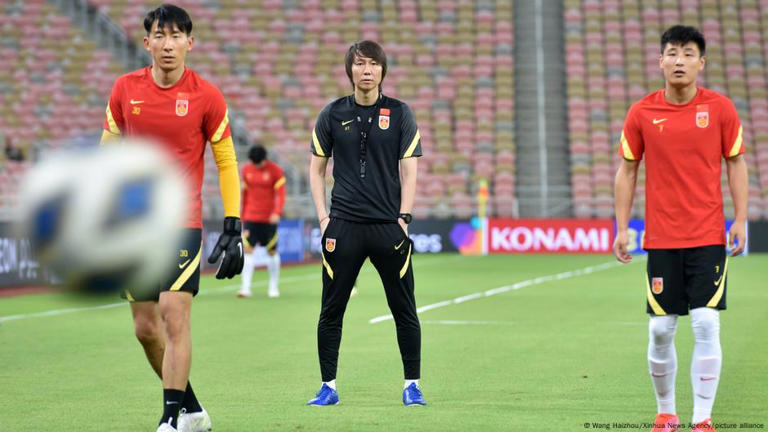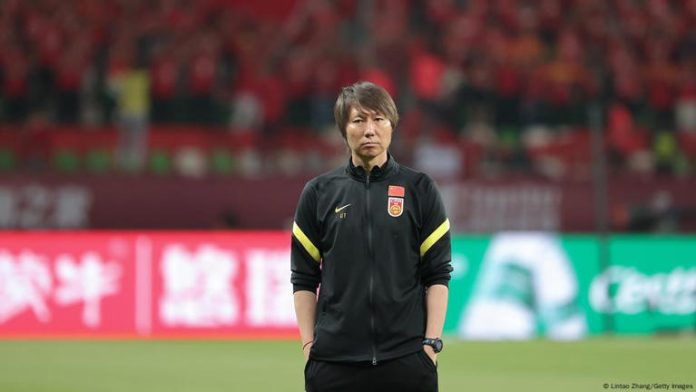Li Tie, the former coach of China’s men’s national football team and a prominent figure in Chinese football, has been sentenced to 20 years in prison on corruption charges, according to reports from state media. The 47-year-old, who once graced the Premier League with Everton, was convicted of accepting millions of dollars in bribes and engaging in match-fixing during his coaching career in the Chinese Super League.
The verdict, delivered by a Chinese court after a protracted trial, is part of President Xi Jinping’s broader anti-corruption campaign that has extended into the sports industry.
Li Tie’s Career in Football
Li Tie is a name that resonates with football fans in China and beyond. As a player, he was one of the first Chinese footballers to make a mark in the Premier League, joining Everton in 2002. His career with the Toffees spanned two years, during which he became a trailblazer for Chinese players seeking opportunities in Europe.
After retiring from professional football, Li transitioned into coaching. He took the helm of China’s national team in January 2020, a role that placed him in the spotlight. However, his tenure lasted only two years, ending in December 2021 amid growing scrutiny over his activities.
The Corruption Charges
Li Tie was found guilty of accepting over $10 million in bribes during his coaching career. The bribes were reportedly linked to securing his position as head coach of the Chinese national team and influencing the outcomes of matches during his time in the Chinese Super League.
In addition to taking bribes, Li admitted to paying $421,000 in bribes himself to secure his role as head coach. This admission came during a state television documentary aired earlier this year, in which Li detailed the widespread corruption that had plagued Chinese football for years.

© Lintao Zhang/Getty Images
“I’m very sorry. I should have kept my head to the ground and followed the right path,” Li said during the documentary. “There were certain things that, at the time, were common practices in football.”
China’s Crackdown on Football Corruption
Li’s sentencing is part of a broader anti-corruption initiative launched by Chinese President Xi Jinping, targeting various sectors, including sports. In late 2022, authorities turned their attention to the football industry, which has been mired in allegations of match-fixing, bribery, and other unethical practices.
This week alone, several former football administrators and officials in China were convicted and sentenced for corruption-related offenses. Li’s high-profile case is among the most significant, given his status as a former national team coach and one of China’s most recognizable football figures.
Match-Fixing in Chinese Football
The Chinese Super League (CSL), once heralded as a burgeoning football powerhouse with high-profile foreign signings, has faced increasing scrutiny over allegations of corruption. Li Tie’s involvement in match-fixing as a club coach sheds light on the extent of the issue within the league.
Former Chinese national football team head coach Li Tie was sentenced to 20 years in prison in a first-instance verdict on Friday for charges including bribery, offering bribes, accepting bribes as a non-state staff member, and offering bribes to non-state staff. The verdict was… pic.twitter.com/X8wRNjPVdp
— Global Times (@globaltimesnews) December 13, 2024
The Chinese government’s anti-graft measures aim to restore integrity and credibility to the sport, which has been marred by scandals for years. Authorities have emphasized their commitment to eradicating corruption and holding accountable those who undermine the sport’s development.
Li Tie’s Role in the Documentary
In January, Chinese state broadcaster CCTV aired a documentary featuring Li Tie, where he candidly confessed to his involvement in corrupt practices. The program served as a public acknowledgment of the deep-rooted problems in Chinese football and highlighted the government’s efforts to combat them.
Li’s admissions during the documentary painted a grim picture of the sport in China, with bribery and match-fixing described as “common practices.” His comments, coupled with his eventual conviction, underscore the systemic issues that have hindered the growth of football in the country.
Public Reaction in China
The sentencing of Li Tie has drawn mixed reactions from the public and the football community. While many view the verdict as a necessary step toward cleaning up the sport, others lament the fall of a once-celebrated player and coach.
Li’s journey from being a football pioneer in the Premier League to a disgraced figure serves as a cautionary tale about the consequences of corruption. His case has sparked discussions about the need for greater transparency and accountability in Chinese football.
The Future of Chinese Football
Li Tie’s conviction is a watershed moment for Chinese football, signaling the government’s determination to address corruption at all levels. However, the road to reform is long and fraught with challenges. Restoring public trust and fostering a culture of fairness and integrity in the sport will require sustained efforts from authorities, clubs, and stakeholders.
Despite the scandals, there is hope for the future of Chinese football. The government’s crackdown on corruption, combined with investments in grassroots development, could pave the way for a brighter era. By addressing the systemic issues that have plagued the sport, China can work toward becoming a competitive force on the global stage.
Key Takeaways from Li Tie’s Case
- High-Profile Conviction: Li Tie’s 20-year prison sentence is one of the most significant outcomes of China’s anti-corruption campaign in football.
- Systemic Corruption: The case highlights the pervasive nature of bribery and match-fixing in Chinese football, from the Super League to the national team.
- Reform Efforts: Authorities are determined to eradicate corruption and restore credibility to the sport, signaling a new era of accountability.
- Cautionary Tale: Li’s fall from grace serves as a stark reminder of the consequences of unethical behavior, even for celebrated figures in the sport.
As Chinese football navigates these turbulent times, the lessons from Li Tie’s case could shape the future of the sport. With sustained efforts to address corruption and promote fairness, Chinese football may yet achieve its ambitions of becoming a global powerhouse.
READ NEXT:


